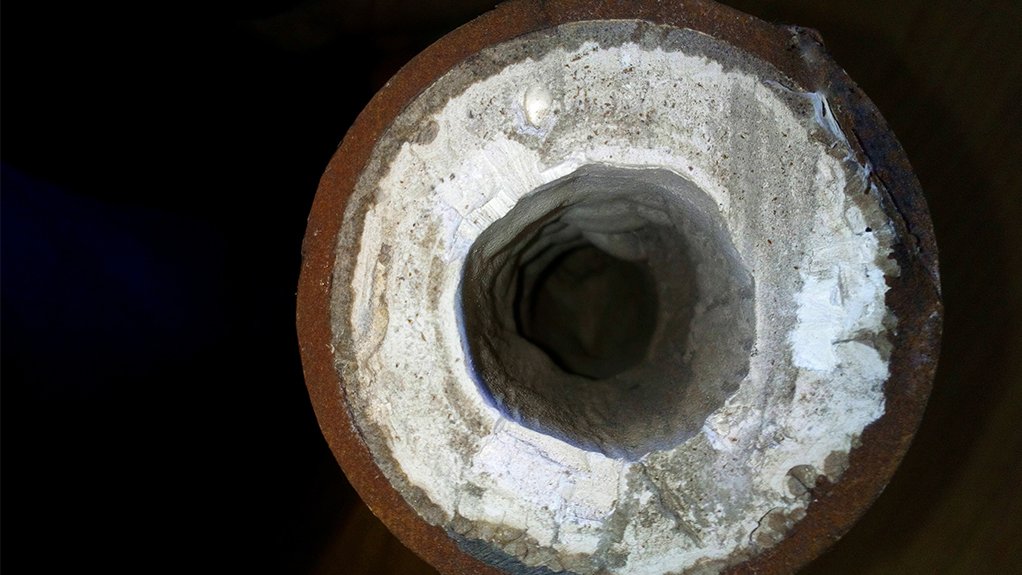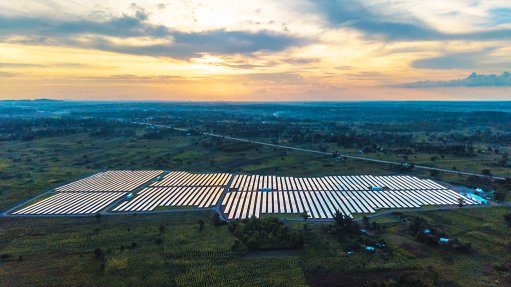Water softener maintenance – protect your equipment and save on energy costs


This photo shows 50mm pipe with scale measuring 10-12mm thick inside it. The flow of water has been dramatically reduced due to lack of maintaining the softener.
This article has been supplied as a media statement and is not written by Creamer Media. It may be available only for a limited time on this website.
All boilers and cooling towers need a water softener to help to prevent scale on heat transfer surfaces. It’s important to maintain these softeners to avoid equipment or machinery failures, and unnecessarily high energy costs.
“A water softener removes hard water minerals, like calcium and magnesium, which can cause scaling and damage in the boiler tubes,” explains Lionel Maasdorp, MD at Allmech – a leading South African manufacturer of boilers and supplier of water treatment components. “Cooling towers are another common application for industrial water softeners. They can operate much more efficiently with softened water. This can help to realise a drastic reduction in maintenance requirements, chemical feed quantity, and the volume of water required for operation. The correct balance of minerals of incoming water to industrial systems is essential to the proper operation and maintenance of expensive equipment.”
Whilst Maasdorp says water softeners are fairly low maintenance equipment, he recommends regular service visits are carried out to ensure that they are operating optimally.
How softeners work
Water softeners use a process called ion exchange to soften the incoming raw water. The process involves the transfer of unwanted hard ions, such as Calcium (Ca+) and Magnesium (Mg+), from the water to a solid substance that accepts these (the resin), and exchanges the ions for a desirable type of ion. Water softeners usually use sodium (Na+) as the exchange ion. Sodium ions are supplied from dissolved sodium chloride (salt). As hard water passes through a softener, the calcium and magnesium trade places with sodium ions.
“Every softener has a bed of resin, and this resin extracts the hardness in your water by capturing the calcium and magnesium ions that cause hardness,” explains Maasdorp. “After a while, the resin bed becomes saturated with these hardness-causing minerals, and there comes the need for ‘regeneration’.
Softener regeneration is simply the process of removing the minerals or ions absorbed from the resin beads in your water softener.”
The regeneration cycle, which restores the exhausted resin capacity consists of four steps: backwashing, brine rinsing, slow rinsing and fast rinsing.
“Water softeners must regenerate regularly to function properly,” says Maasdorp. “While some softeners regenerate daily, others may regenerate once or a few times a week, and some may regenerate just once in two weeks. The frequency of regeneration depends on the volume of your tank, water usage, and hardness of the raw water.”
Key maintenance considerations
When it comes to onsite water softener maintenance, it’s important to check the salt level in the brine tank regularly, and to use the right kind and quality of salt.
“You also need to eliminate what we call ‘salt bridges’ in the brine tank. This is when a hard salt crust develops, which means there’s a barrier between the water and salt. This stops the salt from dissolving properly, often because the salt has been thrown directly into the brine tank without the bag,” says Maasdorp. “Keeping the brine tank clean of mud, build-up or debris at the bottom of the tank is important to keep it operating efficiently.”
He advises ensuring the automated, semi-automated or manual softener control valve is operating correctly by regenerating the water softener as per its technical specifications.
A planned maintenance programme will ensure that problems are avoided or managed quickly as they arise. It is important to select the correct type of treatment plan to suit the operation’s needs. “At Allmech, we offer our customers a monthly maintenance service, which includes all the aspects required to keep their softeners functioning optimally,” says Maasdorp.
This includes:
• Water analysis report on key parameters for raw water, soft water, feed water
• Boiler or cooling tower analysis on key operating parameters
• Equipment analysis and adjustments when required
• Repair on wear and tear items
• Repair of faulty items
• Delivery of chemicals and salt
• Upgrades of systems
• Technical support after installation
• Fully equipped, in-house service and test bench for valve repairs or maintenance
“The pre-treatment system is the most critical part of the total boiler water system, as it ensures water impurities are either removed or reduced to acceptable levels,” says Maasdorp. “Taking proper care of your softener is the best way to protect your investment in your boiler or cooling tower equipment.
Comments
Press Office
Announcements
What's On
Subscribe to improve your user experience...
Option 1 (equivalent of R125 a month):
Receive a weekly copy of Creamer Media's Engineering News & Mining Weekly magazine
(print copy for those in South Africa and e-magazine for those outside of South Africa)
Receive daily email newsletters
Access to full search results
Access archive of magazine back copies
Access to Projects in Progress
Access to ONE Research Report of your choice in PDF format
Option 2 (equivalent of R375 a month):
All benefits from Option 1
PLUS
Access to Creamer Media's Research Channel Africa for ALL Research Reports, in PDF format, on various industrial and mining sectors
including Electricity; Water; Energy Transition; Hydrogen; Roads, Rail and Ports; Coal; Gold; Platinum; Battery Metals; etc.
Already a subscriber?
Forgotten your password?
Receive weekly copy of Creamer Media's Engineering News & Mining Weekly magazine (print copy for those in South Africa and e-magazine for those outside of South Africa)
➕
Recieve daily email newsletters
➕
Access to full search results
➕
Access archive of magazine back copies
➕
Access to Projects in Progress
➕
Access to ONE Research Report of your choice in PDF format
RESEARCH CHANNEL AFRICA
R4500 (equivalent of R375 a month)
SUBSCRIBEAll benefits from Option 1
➕
Access to Creamer Media's Research Channel Africa for ALL Research Reports on various industrial and mining sectors, in PDF format, including on:
Electricity
➕
Water
➕
Energy Transition
➕
Hydrogen
➕
Roads, Rail and Ports
➕
Coal
➕
Gold
➕
Platinum
➕
Battery Metals
➕
etc.
Receive all benefits from Option 1 or Option 2 delivered to numerous people at your company
➕
Multiple User names and Passwords for simultaneous log-ins
➕
Intranet integration access to all in your organisation



















